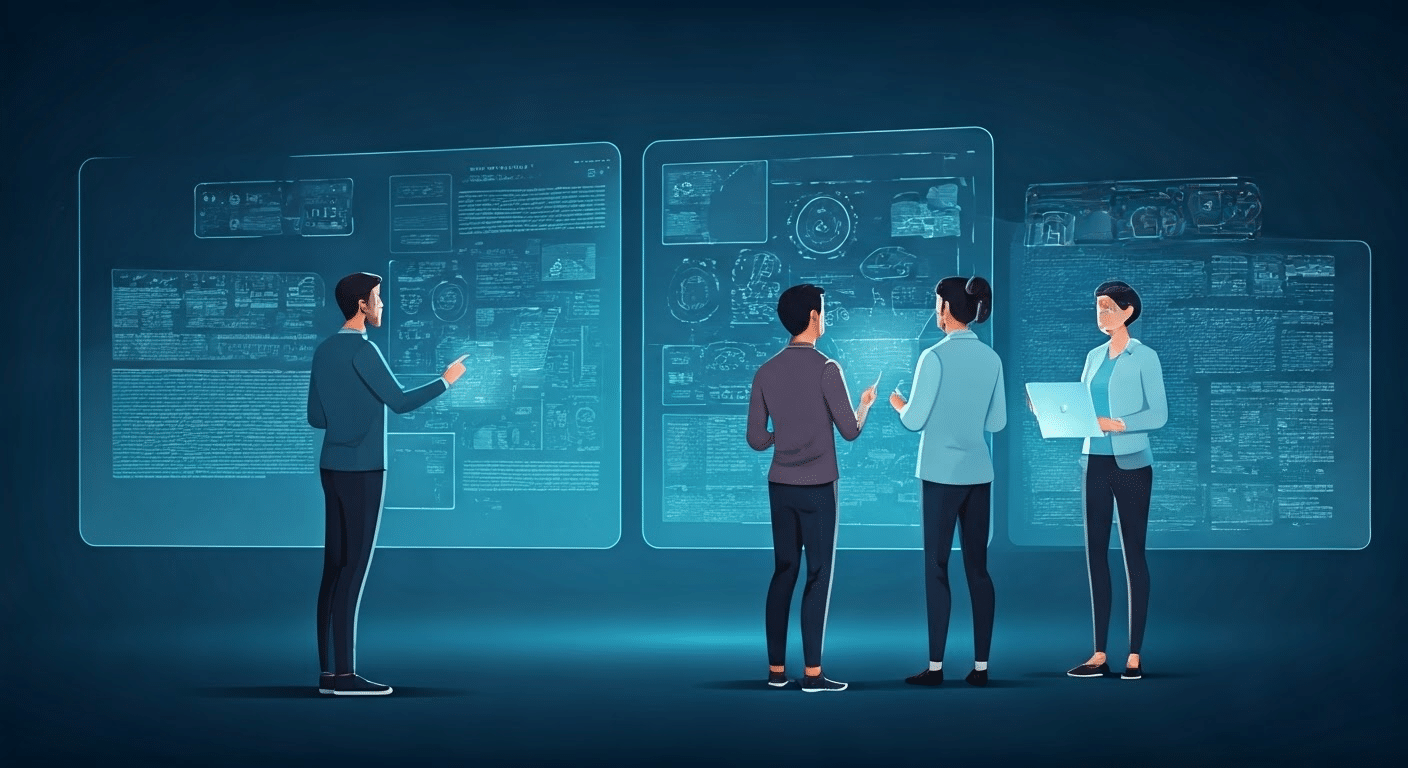The Future of AI for Employee Training and Development
Artificial intelligence (AI) is reshaping how organizations approach employee training and development. By infusing new technologies like natural language processing into learning and development processes, businesses can optimize their strategies for workforce upskilling. AI’s impact extends beyond routine automation, enabling tailored learning experiences and smarter decision-making. As industries evolve, leveraging AI to address skill gaps and accelerate career progression helps future-proof the workforce, ensuring an adaptable employee training framework that aligns with organizational goals.


The Role of AI in Modern Employee Training Programs
AI is transforming traditional training frameworks into dynamic, data-driven experiences. In modern employee training programs, AI tools analyze vast amounts of data to uncover individualized learning preferences, enabling organizations to craft bespoke development plans that meet employee and business goals alike.
Moreover, AI facilitates interactive content creation, adaptive learning paths, and automated feedback systems, ensuring employees consistently progress toward their career objectives. For HR teams, AI’s seamless integration into training strategies paves the way for more effective workforce management and talent optimization.
Bridging the Skills Gap with AI-Enhanced Training
Skill gaps are a pressing issue for HR teams, particularly in industries undergoing rapid technological changes. Generative AI plays a pivotal role in identifying these gaps within training programs and delivering solutions tailored to individual and team needs.
By harnessing generative AI tools, organizations can design adaptive training modules that address employee weaknesses while reinforcing existing competencies. These tools employ real-time feedback mechanisms to identify areas of learning improvement, ensuring constant progression without unnecessary delays.
Furthermore, generative AI enhances workforce alignment with business goals by suggesting relevant skills training to meet organizational needs. Whether it’s training data scientists, upskilling customer service teams, or grooming future business leaders, AI empowers HR teams to provide employees with actionable, personalized learning paths that drive both immediate and long-term career success.
Personalization of Learning Experiences Through AI
AI is redefining personalization in employee training. By analyzing individual learner data, it crafts customized training modules that mirror employee career aspirations, learning styles, and pace preferences.
For learners, AI enables dynamic content delivery suited to their unique backgrounds and job roles. It curates videos, simulations, and quizzes in alignment with skill requirements, ensuring an enriching and targeted learning experience. This holistic personalization bolsters engagement and improves learning outcomes.
Additionally, AI-driven systems evaluate employee performance in real time, suggesting tailored improvements that align with evolving goals. This continuous assessment guarantees that learning experiences remain relevant, scalable, and impactful in nurturing professional growth. Through AI, training becomes more than a checklist—it transforms into a strategic tool that enhances employee competencies while aligning their development with organizational priorities.

Implementing AI in Training and Development Strategies
The successful implementation of AI in training and development demands strategic planning and clear goals. Organizations must identify how AI can complement existing training programs, making them more effective and adaptable to changing business landscapes.
Using AI-driven tools, HR teams can create interactive modules, automate repetitive tasks, and optimize training content delivery. Focused execution ensures business leaders reap the rewards of improved employee engagement, skill acquisition, and workforce alignment with broader corporate objectives.
Identifying Key Areas for AI Integration
HR teams can leverage AI to enhance business operations by identifying critical integration points within training strategies. From analyzing employee sentiment to forecasting future workforce needs, AI simplifies complex processes into actionable insights.
For example, organizations can deploy AI in talent acquisition, using algorithms to match job roles to candidates with precision. Similarly, AI identifies skill gaps within teams and formulates targeted development programs to bridge those gaps. This application aligns employee goals with broader business objectives.
Furthermore, AI supports HR in resource allocation, ensuring efficient distribution of assignments and optimizing development timelines. By prioritizing key areas for integration, HR teams unlock the potential of AI to drive transformative operational outcomes while enriching workforce management strategies.
Developing an AI-First Training Curriculum
An AI-first curriculum encourages employees to embrace AI tools while aligning their career goals with the organization’s mission. Incorporating course content tailored to generative AI, machine learning, and natural language processing ensures training courses remain future-focused.
Employees learn core competencies while gaining exposure to AI-integrated applications, which are vital to achieving effective training outcomes. Simultaneously, interactive modules, such as those emphasizing data analysis and prompt engineering, equip employees to leverage AI confidently in their roles.
Ultimately, AI-powered curriculums create a robust framework where employee aspirations meet business growth. This approach promotes career-guided learning experiences, nurturing high-performing teams that thrive in an AI-driven workforce.
Benefits of AI in Employee Development
AI offers immense benefits for employee development, including accelerated learning curves and enhanced retention rates. By personalizing training courses and leveraging analytics, AI ensures learners master topics more effectively.
Real-time feedback and adaptive learning paths provide employees ongoing support, enabling them to achieve professional milestones while aligning with business goals. Furthermore, AI streamlines complex processes, improving overall workforce efficiency. These benefits enhance organizational competitiveness, making AI integration indispensable in modern training frameworks.
Accelerated Learning and Improved Retention Rates
Accelerated learning is a key advantage of AI-powered training solutions. Organizations use AI algorithms to analyze learning patterns and deliver customized course content tailored to individual preferences, ensuring maximum learning efficiency.
AI additionally improves retention rates by coupling interactive materials with real-world applications. From VR modules to adaptive quizzes, employees feel more engaged, fostering deeper understanding of complex topics while reducing information loss over time.
Effective training strategies powered by AI optimize workforce abilities, delivering stellar results in employee capability enhancement. With accelerated learning and retention, businesses future-proof their teams against evolving industry challenges.
Real-time Feedback and Adaptive Learning Paths
Real-time feedback mechanisms offered by AI empower employees to identify performance gaps instantly, encouraging them to improve through dynamic adjustments to their learning paths. Adaptive AI systems continuously evaluate progress to recommend next steps in training.
These feedback mechanisms also drive personalized teaching experiences, ensuring content remains relevant and effectively supports learners in accomplishing their goals.
By fostering seamless adaptability in training programs, AI solutions enhance workforce efficiency, helping employees evolve alongside business expectations. As a result, adaptive learning pathways deliver enriched employee experiences tied to measurable performance growth.
Challenges and Considerations in AI-Powered Training
Implementing AI in training systems presents unique challenges like data privacy concerns and equity issues. Addressing these is crucial for ensuring fair AI-driven experiences.
Transparency in algorithm design, minimizing biases, and safeguarding sensitive information promote ethical AI deployment. Understanding these challenges upfront allows businesses to create robust frameworks that balance innovation with accountability.

Addressing Data Privacy and Security Concerns
AI tools rely on extensive data, often including sensitive employee details. Organizations must implement secure data protocols to prevent breaches and comply with privacy regulations.
Potential biases also pose concerns, as flawed algorithms may inadvertently hinder employees’ fair development opportunities. To mitigate this, HR teams must assess AI systems for transparency and reliability, ensuring ethical application.
By addressing privacy and security challenges, organizations can confidently integrate AI, fostering trust in its deployment for workforce training.
Ensuring Equity in AI-Driven Learning Environments
Equity remains a cornerstone of AI-powered systems. Organizations must ensure algorithms are free of bias, offering fair learning opportunities to diverse employee groups.
AI design principles should focus on fostering inclusivity and minimizing disparities based on race, gender, or other identifiers. Ethical application supports an equitable AI-driven workforce, promoting balanced development.
Additionally, oversight from HR teams ensures AI solutions align with organizational DEI initiatives, reinforcing fairness in deploying advanced technologies across employee development programs.


Future Trends in AI for Employee Training
AI in training is rapidly advancing, with virtual and augmented reality modules revolutionizing immersive learning. Integration with emerging technologies further boosts efficiency.
As organizations explore AI’s capabilities, adaptive applications and cross-functional tools reshape employee development, ensuring businesses stay ahead of competitive industry standards. Future trends promise dynamic transformation in organizational training strategies.
Integration of AI with Other Emerging Technologies
AI seamlessly integrates with platforms like cloud computing and IoT, enabling businesses to implement high-impact training strategies. For example, AI combined with chatbots boosts interaction in training simulators, while blockchain ensures data integrity for course certifications.
These integrations allow HR teams to develop tailored, effective training frameworks that unify multiple technologies into cohesive learning solutions. The result is streamlined employee onboarding and advanced development dynamics.
The future of AI in employee training and development promises to revolutionize how organizations equip their workforce with essential skills. As we’ve explored, AI enhances training programs by personalizing learning experiences, closing skills gaps, and providing real-time feedback that fosters accelerated learning and improved retention rates. However, it’s imperative for organizations to navigate challenges such as data privacy and equity to fully realize the potential of AI-driven training. Embracing emerging technologies like virtual and augmented reality will further shape the landscape of employee development. By staying ahead of these trends and integrating AI thoughtfully into training strategies, businesses can not only enhance their training processes but also cultivate a more skilled, adaptable, and engaged workforce. Now is the time to invest in these innovative solutions that position your organization for success in an ever-evolving work environment.
Leading organizations and institutions are transforming learning with Echo360.





















